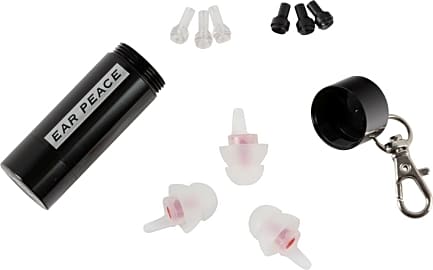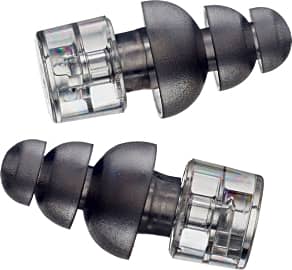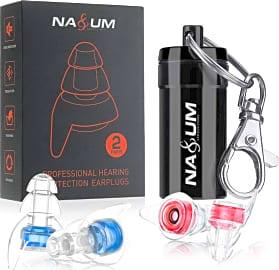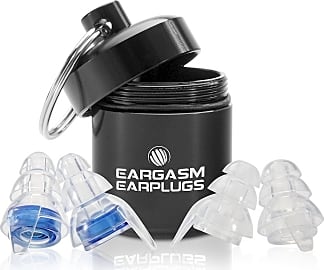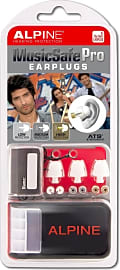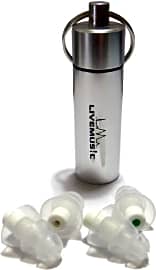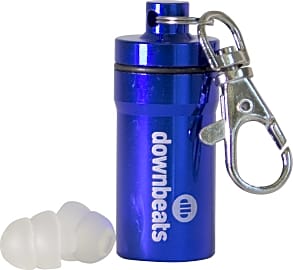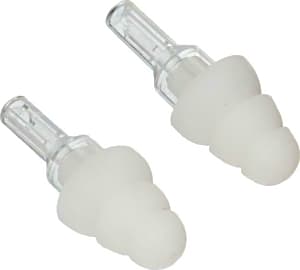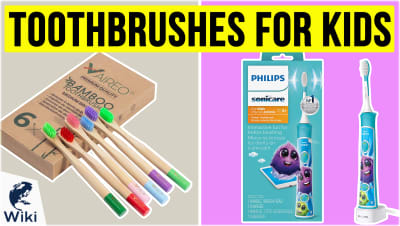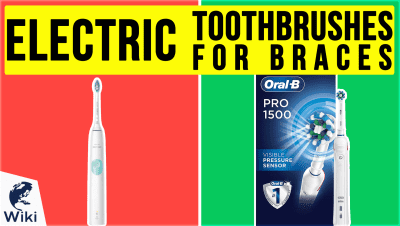The 10 Best Earplugs For Concerts

This wiki has been updated 35 times since it was first published in April of 2017. A ringing in your ear occurs after particularly loud shows that, over time, can be very damaging to your hearing if proper precautions aren't taken. It used to be that earplugs muffled the music nearly to the point of incoherence. Now there are options tailored specifically toward live music experiences that can protect your ears while still delivering the best sound quality possible. When users buy our independently chosen editorial choices, we may earn commissions to help fund the Wiki.
Editor's Notes
November 12, 2020:
With this latest update to our list, we wanted to make sure to emphasize the modernization of hearing protection. Largely, unless strapped for time or cash, single-use earplugs have been made obsolete. They sacrificed sound quality in favor of protection and rightly so. However, today, that is a sacrifice that no longer needs to be made. As a result, Mack's Soft Earplugs were removed.
We now have a new number one selection: the Vibes High Fidelity. They were selected because of their versatility and functionality, equal in quality to some of the other heavy-hitters such as the previous selection for first, the Earasers Hi-Fi, yet cost significantly less. The other new addition, the Nasum Concert Earplugs, are incredibly inexpensive and feature a unique design but were only placed fifth due to the sheer quality of the other selections.
Most of the choices retain their positions as they still hold up in quality and versatility. These are earplugs for the music lovers out there, listeners and musicians alike. Keep those ears clean.
If you enjoyed this list and are looking for other ways to improve how you listen to music, be sure to check out our list of the top 10 best headphones.
July 16, 2019:
In updating our list, we've tried to strike a balance between price, noise reduction, and comfort. None of the items on our list reach a perfect score on all three counts, especially considering the fact that each person's ears are shaped differently. However, we strongly believe that our newly-appointed top 3 picks are as close to perfection as one can expect from over-the-counter earplugs. They vary very little in their effectiveness, so take your own budget into account when making your decision. If you're really pressed for cash, our #5 pick, the Mack's Acoustic, are as good as you can hope for in a cheap, single-use pair.
It is important to note that custom earplugs are the surest way to protect your ears, and will probably offer more even attenuation across the frequency spectrum because they tunnel into the ear canal more deeply. Also, you should be aware that using earplugs too frequently can eventually lead to an unhealthy buildup of earwax, which may itself contribute to the development of tinnitus in the long term. This, however, is unlikely for occasional concertgoers whose use of earplugs is infrequent. Musicians, stage hands, and sound techs, on the other hand, will definitely want to keep this in mind. Be sure to consult with an audiologist before making a decision.
Special Honors
Westone ES49 Custom Designed primarily for musicians who must endure the onslaught of amplified noise on a regular basis, these cost about 10x more than the standard pair of plugs — and for good reason. Thanks to their canal-style design, they offer what is arguably the flattest attenuation out there, and because they're custom-molded to your ear, they create a perfect seal. You can choose between 9, 15, or 25 dB filters. westone.com
JH Filtered Designed and manufactured in Orlando, Florida, these soft silicone custom-molded plugs wont muddle up the sound you hear; rather, they'll reduce the volume of the noise around you while keeping its fidelity in tact. The premium silicone used is soft and ultra-comfortable, and the plugs themselves are connected by a plastic cord, which those who are prone to losing individual plugs will appreciate. Given their quality, they may last for years. After making an impression of your ear, including parts of the outer ear that are important to take into account when forming a custom mold, you'll send the impressions to the company's lab, where it should take 5-10 days before you receive your custom earplugs. jhaudio.com
How Exactly Does Loud Sound Damage The Ears?
When too many of these connections are severed, it becomes difficult to distinguish foreground and background sounds.
To understand how loud sound damages the ears, we must first understand what sound actually is. To put it simply, sound is vibration. All noise we hear is caused by vibrations that spread as an audible wave of pressure though some medium, such as air or water. As the sound wave enters our eardrum, it passes into the cochlea. Inside of the cochlea are rows and rows of microscopic hair cells. The sound waves, which as we just learned are simply vibrations, cause these microscopic hair cells to move, sending signals to the brain via the auditory nerve. The various tones are interpreted by the brain based on how quickly they move the hair cells.
The louder the sound, the more the hair cells move. Overworking these hair cells by regularly exposing them to loud sounds can eventually cause them to die. Unlike many other cells in our body, inner ear hair cells cannot regenerate. If enough of your microscopic hair cells die, it will cause permanent hearing loss. Luckily, people are born with more inner ear hair cells than we need to hear what is happening around us, roughly 16,000 on average. We can damage between 30 and 50 percent of them before any loss of hearing is noticeable.
If you have ever attended a sporting event or concert and noticed that sounds seemed muffled after you left or that you heard a constant ringing, you have caused some damage to the hair cells within your ear. When they are damaged, they bend or lie down, very much like blades of grass. If the damage wasn't enough to kill them, they will slowly stand back up over a couple of hours or days, returning your hearing to normal. However, if the damage is too severe, they will die instead of straightening back up. Repeat this process too many times and you'll wind up with hearing loss or tinnitus.
Modern research has also revealed that overly loud noises can also severe connections between nerve fibers at the end of the microscopic hair cells and the brain. When too many of these connections are severed, it becomes difficult to distinguish foreground and background sounds. This is why people with certain forms of hearing damage may have trouble holding a conversation in crowded areas, but be able to easily hear somebody when conversing in a quiet place.
Why It Is Important To Protect Your Ears At A Concert
Most people falsely believe it takes years of exposure to loud noises to cause hearing problems, but this is decidedly untrue. In fact, for some unlucky few, all it takes is one overly loud concert to set in motion a lifetime of hearing and ear problems. It also rarely happens like it does in movies where there is a single, catastrophically-loud clap or bang, like a gunshot, right next to someone's ear. Rather, most people don't even notice it until the fun and music is over and they are leaving the concert. At this point, they may notice a mild ringing or feel like they are in a bubble, much like how things sound when you have a cold and your head is stuffy. For most, these issues will resolve themselves after a couple of hours or days, for others though, this is just the beginning of their problem, as more symptoms may begin to appear over the coming days, months, or even years.
Most people falsely believe it takes years of exposure to loud noises to cause hearing problems, but this is decidedly untrue.
Sounds don't have to be as loud as many people think to cause hearing damage, either. Repeated exposure to sound levels as low as 85 decibels can cause hearing issues over time, which is roughly equivalent to the noise level of heavy city traffic or a garbage disposal. A normal conversation in a restaurant usually measures right around the 60-decibel range. The music at concerts often measures between 100 and 120 decibels. According to the the Centers for Disease Control and Prevention, 100 decibels has the potential to cause hearing loss after just 15 minutes of exposure, and 120 decibels is enough to instantaneously cause pain and hearing loss.
Considering that the average concert is at least two hours long, there is a high possibility of causing at least some hearing damage. If you're attending an all-day music festival, the odds of causing significant hearing loss are even higher. Don't worry though, we aren't killjoys and definitely aren't recommending that you can't go see your favorite bands in action. Instead, just be smart about it and protect your ears with a pair of concert earplugs so you can avoid being one of the 81 million Americans who suffer from noise-induced hearing loss.
How Concert Earplugs Are Different From Standard Earplugs
Unlike traditional earplugs, concert earplugs won't completely muffle or distort sound. Rather, they are specially designed to preserve sound quality, while at the same time lowering the volume to a more ear-friendly level. They achieve this by using unique acoustic filters that lower noises in a uniform level across the entire sound spectrum. Traditional earplugs lower some sounds more than others, resulting in deteriorated listening experience. Concert earplugs preserve that high fidelity experience you go to a concert to enjoy, while ensuring you don't permanently damage your hearing, so you can continue to appreciate music for the rest of your life.
Another drawback of traditional earplugs is the way they muffle voices. Most people find it difficult to carry on a conversation while wearing earplugs for the same reason that they make music listening less enjoyable — the way they distort some sound frequencies more than others. This can make words and intonation very difficult to comprehend. With concert earplugs, this won't happen. All of the words your conversation partner is speaking will be just as easy to understand, you will just hear them at slightly lower levels. Additionally, concert earplugs generally have a low-profile design so as not to be noticeable by others.
If you still think wearing earplugs to a concert is weird, consider this: nearly every single musician wears them when they perform.



